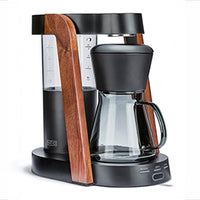Your Filters Might Be the Problem: Avoiding Paper Taste in Your Coffee
You followed the recipe. The grind looks good. The pour was steady. And yet... there’s something just a little off in your coffee — a flatness, a strange aftertaste, a lack of clarity. Before blaming your beans or brewer, check your filter. It might be the paper.
Paper filters are common in pour-over and drip brewing, but they can add an unwanted flavor to your cup if not handled properly. The good news? It’s easy to fix once you know what to look for.
What Is the “Paper Taste” in Coffee?
The taste some people describe as “papery,” “cardboard-like,” or even “chemical” comes from the natural fibers and compounds in untreated paper filters. When hot water passes through a dry paper filter, it can carry some of those residual flavors into your brew.
While it’s more noticeable in delicate, light-roasted coffees, even dark roasts can suffer from dullness or masking effects if paper taste is present.
The Simple Fix: Pre-Rinsing Your Filter
The most effective way to prevent paper taste is to rinse your paper filter with hot water before brewing. Here’s how:
-
Place the filter in your brewer
-
Pour hot water through it to fully saturate
-
Discard the rinse water before adding coffee grounds
This flushes out unwanted flavors and also warms up your brewing vessel — a bonus for heat stability.
Types of Paper Filters and What They Mean for Flavor
Not all paper filters are created equal. Each type has its own characteristics:
-
Bleached (white) filters: Treated to remove natural paper color; tend to have less noticeable paper flavor
-
Unbleached (brown) filters: More natural but often require more rinsing to avoid taste transfer
-
Thick or multi-ply filters: May absorb more oils, affecting mouthfeel and flavor clarity
Experiment with different brands and types — you might find your brew improves just by switching filters.
When You Can Skip the Paper Altogether
Some coffee drinkers opt for metal mesh filters or cloth filters to avoid paper taste and retain more coffee oils. These options can enhance body and depth, though they often require more cleaning and slightly different grind sizes.
Each filter style affects taste, clarity, and mouthfeel differently — there’s no one-size-fits-all. It depends on what you want in the cup.
Are You Using the Right Filter for Your Brewer?
Using an incompatible or poorly fitted filter can create channeling, uneven flow, or inconsistent saturation — even if the paper is high quality.
Make sure your filter fits snugly in your brewer (especially for cone-style pour-overs like V60 or Chemex) and doesn’t fold or collapse during the pour.
When Taste Still Feels “Off”
If you’ve rinsed and used the right filter but your brew still tastes flat or odd, it could be a combination of:
-
Stale coffee beans
-
Water quality (chlorine or minerals)
-
Grind inconsistency
-
Improper ratio or brew time
Remember, filter taste is just one variable — but an easy one to fix.
Thoughtful Brewing Starts With Details
The best cups of coffee come from care at every step — including ones that seem minor, like rinsing your filter. It’s a small gesture that can make a surprising difference in taste and aroma.
If you're using a well-designed machine that already controls timing and water flow, make sure you're not sabotaging it with something as basic as an unrinsed filter.
Built for Clean Flavor
Brewers from Ratio Coffee are designed to deliver clean, consistent cups — and they work even better when paired with a properly rinsed filter. While these machines help automate the brewing process, your attention to detail still matters. A clean filter plus an intelligent brewer equals one less thing standing between you and a great cup.
Frequently Asked Questions
Why does my coffee taste like paper?
If you’re using a dry paper filter without rinsing it first, that flavor can transfer into your coffee during brewing.
Do bleached filters taste better than unbleached?
Bleached filters generally impart less flavor, but rinsing is recommended for both types.
Can I reuse paper filters?
It’s not recommended. Used filters retain oils and residue that can affect taste and cleanliness.
Is switching to metal filters better?
It depends. Metal filters preserve more oils and body but may let some sediment through. Great for depth, less so for clarity.
 Ratio Eight S2
Ratio Eight S2
 Ratio Eight Original
Ratio Eight Original
 Ratio Six
Ratio Six
 Ratio Four
Ratio Four
 Compare Machines
Compare Machines






